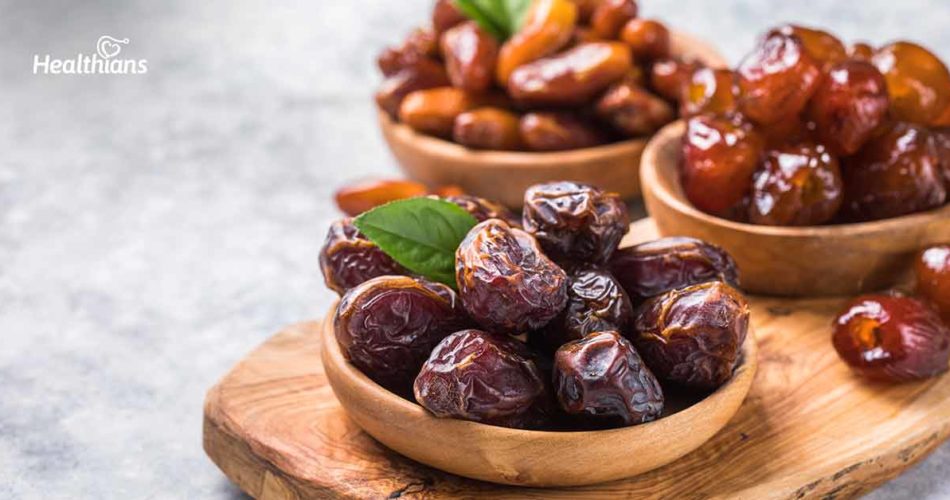Contributed by: Healthians Team
Introduction
The winter season is the perfect time to consume dates (khajoor), given that they are known to raise the heat in the body during winters.
According to experts, dates are a superfood that should be consumed extensively during winters to keep the body warm and protect it from all sorts of infections.
From medical science to Ayurveda, everywhere it has been accepted that dates have a treasure trove of health benefits.
Science has proven the healing powers of this dark fruit. This wrinkly fruit brings a punch of sweetness — and nutrition — which is why experts advise consuming dates daily for overall health.
Dates are known to have therapeutic properties. They are the storehouse of essential vitamins, potassium, phosphorous, fibre, calcium, copper and magnesium.
They are widely touted for their high vitamins content like thiamin, riboflavin, niacin, folate, Vitamin A, B6 and Vitamin K. Studies indicate that there are at least 15 minerals present in dates and 23 types of amino acids and unsaturated fatty acids
In this blog, we will explore the health benefits of dates, and why you should totally stock up on this superfood for a healthy winter companion.
Enhances bone health
During the winter, less exposure to sunlight can wreak havoc on bone health. This can be avoided by having dates in your diet, which are high in calcium and help in strengthening bones.
Brings relief to arthritis pain
A study in the support of dates in reducing arthritic pain showed that dates are great in rheumatoid arthritis management due to their anti-inflammatory properties.
Dates contain high minerals such as potassium, phosphorus, copper, and magnesium, which help to prevent bone diseases such as osteoporosis and arthritis.
Reduces heart attack risk
In recent years, researchers have become increasingly interested in the ability of dates to keep your heart healthy.
Being a rich source of magnesium, consumption of dates lowers bad cholesterol and thereby lowers the risk of high blood pressure and stroke.
A healthy twist to desserts
Dates are widely consumed throughout the world as they are a healthy sugar substitute. In fact, because of its low glycemic index, diabetics can safely eat this fruit.
They include natural sugars such as sucrose, fructose, and glucose, which provide an immediate energy boost when chewed.
As they are rich in natural sugar, dates can work as a healthy alternative to refined sugar to sweeten all desserts you are planning for Christmas and New Year.
Energy boosters
Dates are a great food item to include in your diet when you are feeling lethargic and sluggish on a cold winter morning.
They are also ideal for pre-workout snacking, due to their energy-boosting properties.
Iron-rich
Dates are a high-iron food that can help boost your haemoglobin (Hgb) levels and increase red blood cell synthesis.
This is why most women are advised to eat dates during pregnancy to maintain their iron levels and support the growth and development of their growing foetus.
Also, there are results from studies that show that eating dates at the later stages of pregnancy can help in making the entire process of delivery much smoother.
Likewise, the use of dates in the treatment of iron deficiency anaemia (IDA) in children has been proved to be beneficial.
Dates keep digestive problems away
Dates are rich in both soluble and insoluble fibres that help to keep the digestive system smooth.
Since they are rich in iron and potassium, this wondrous food is an excellent means of improving digestive health.
Dates help in increasing the secretion of digestive juices and cultivate friendly bacteria in the intestines.
Nourishes skin
The dipping mercury and the dryness of winters can make the skin lose its natural oil.
Consuming two dates daily nourishes your skin and hair, improves complexion and keeps the moisture levels in check.
Its anti-oxidant properties help to attain youthful skin and repair the damage caused by free radicals.
Final thoughts
Dates may appear to be the next “super-food” due to their numerous health benefits.
Yes, dates are a nutritious, delicious, and convenient snack; however, they do have one important disadvantage: their high-calorie content.
So remember to avoid overeating in one sitting and consider capping your intake to just three dates to your diet every day.
Besides, adding dates to your winter diet, you must also opt for preventive diagnostic tests to identify complications (if any) and take measures to protect your overall well-being.




